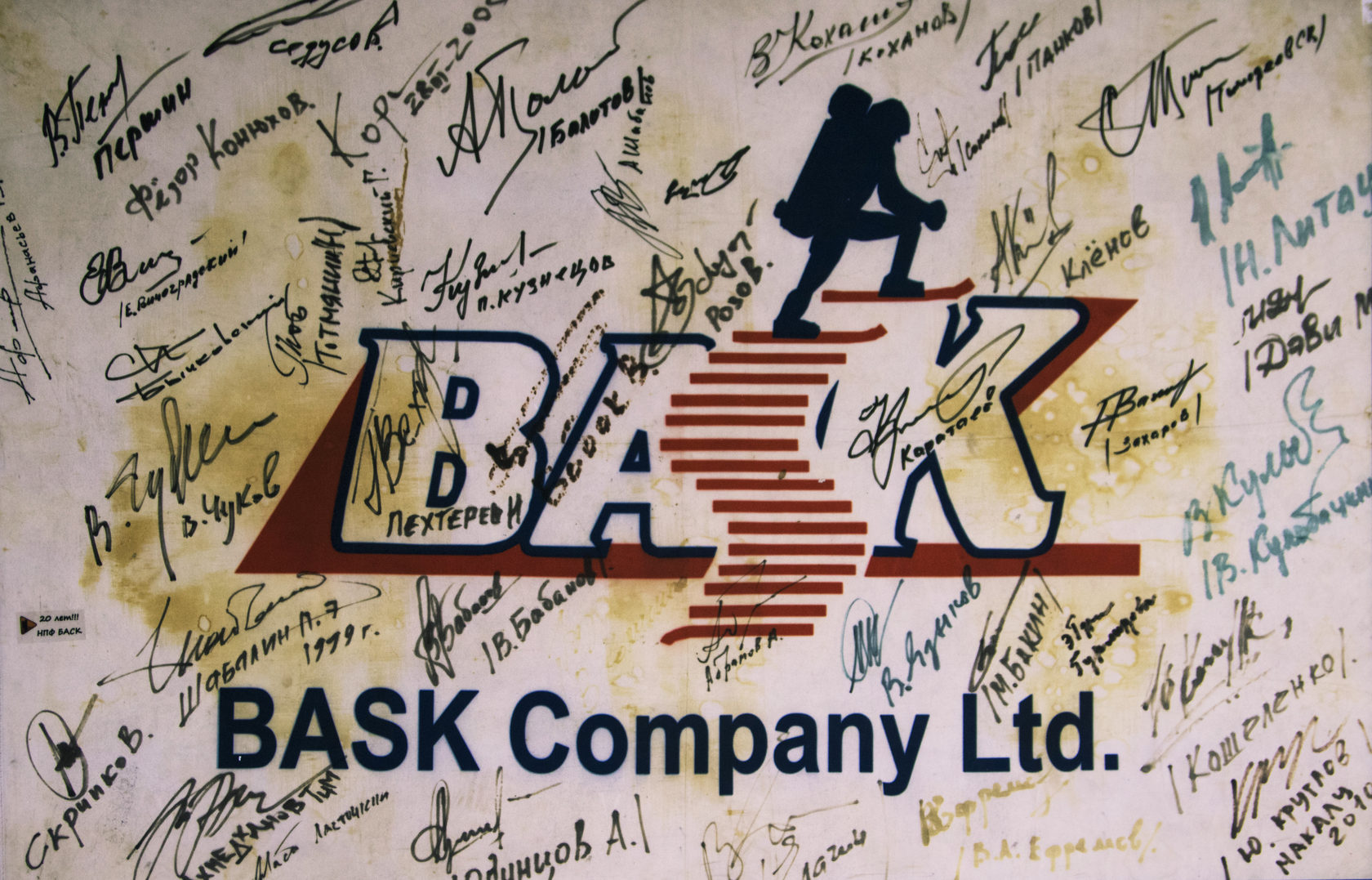BASK [INTERVIEW]

BASK [INTERVIEW]
For our 5th anniversary magazine issue, we have explored the market of functional clothing production in Russia from different angles. Creating a modern technological production and maintaining it for 30 years – not the most sustainable years of our country's formation – is not an easy task. Our guest today is an example of competition with the world market, the fight against counterfeit products within the country, and the problems of the Russian light industry – here are just some of the topics that we discussed in our interview with Vladimir Bogdanov, CEO and founder of BASK – one of the largest Russian outdoor company.
Questions: Nikita Osaulenko.
Answers: Vladimir Bogdanov [BASK CEO].
Photo: Ivan Dzhatiev.
Edit, layout: Alexander Zabelin.
Answers: Vladimir Bogdanov [BASK CEO].
Photo: Ivan Dzhatiev.
Edit, layout: Alexander Zabelin.
[What are your thoughts on the new "techwear" phenomenon?]
Speaking about "techwear": in Russia this trend has been copied countless times by newcomers since it was born. And that's the wrong path in my opinion. We've started with an outdoor itself and in 2019 we celebrated the 30-years anniversary of our company. In '99 we even came up with an adaptation of the word "outdoor" to Russian – "active leisure". The first store of ours was named this way (Moscow, near Rizhskaya station). We've mastered all the technologies step by step, working with down fill, sizing, membranes and softshell. If we get closer to something fashionable, "techwear", for example, then we try to preserve our knowledge in these form of application.
Speaking about "techwear": in Russia this trend has been copied countless times by newcomers since it was born. And that's the wrong path in my opinion. We've started with an outdoor itself and in 2019 we celebrated the 30-years anniversary of our company. In '99 we even came up with an adaptation of the word "outdoor" to Russian – "active leisure". The first store of ours was named this way (Moscow, near Rizhskaya station). We've mastered all the technologies step by step, working with down fill, sizing, membranes and softshell. If we get closer to something fashionable, "techwear", for example, then we try to preserve our knowledge in these form of application.
Unlike most brands in our time, who turn to third-party factories, we develop everything ourselves: patterns, samples, fabrics selection. And here in Russia we do everything.
For example, Sivera – our former production. They came up the same way.
That's a very time consuming process. We have 30 foreign suppliers of fabrics and fittings, we have to import everything ourselves, deal with customs clearance – all that stuff. It is much easier to outsource production. Brands nowadays really get along with outsource.
For example, Sivera – our former production. They came up the same way.
That's a very time consuming process. We have 30 foreign suppliers of fabrics and fittings, we have to import everything ourselves, deal with customs clearance – all that stuff. It is much easier to outsource production. Brands nowadays really get along with outsource.
[Are you in good touch with Sivera now?]
Well, we are. We are all friends in this market. We started back in the days when the outdoor industry was just emerging in our country. In general, if you look at Russian outdoor brands, then everyone started at about the same time. Therefore, we are all friends. Competition is sacred. However nobody will bite anyone too hard.
[Except for you and Sivera, no one has such technological developing in CIS-region?]
Red Fox has a small batch facility in St. Petersburg. It has to stand out, but basically they outsourced it to China. That's all right for outdoor vendors, who functions this way. There are, of course, fashion-oriented brands that are produced fundamentally in Russia.
"Poet" [Alexander Selivanov, founder of Codered], for example, considers this rule fundamental.
Well, we are. We are all friends in this market. We started back in the days when the outdoor industry was just emerging in our country. In general, if you look at Russian outdoor brands, then everyone started at about the same time. Therefore, we are all friends. Competition is sacred. However nobody will bite anyone too hard.
[Except for you and Sivera, no one has such technological developing in CIS-region?]
Red Fox has a small batch facility in St. Petersburg. It has to stand out, but basically they outsourced it to China. That's all right for outdoor vendors, who functions this way. There are, of course, fashion-oriented brands that are produced fundamentally in Russia.
"Poet" [Alexander Selivanov, founder of Codered], for example, considers this rule fundamental.
We specialize in warm layers, because it's easier for us to compete with foreign brands in this direction. After all, they do not have such temperatures anywhere. Most likely, such equipment would go well in Canada, Scandinavia. However they have a comfortable public transport system. Commuters prefer to use normal layers. You know, in Russia people are afraid that they will get stuck in traffic, it will run out of gas or something else. The main thing is you pick up clothes you can survive in. In this direction, we stick to this mental process and produce various warm layers, perhaps too warm for the rest of the world.
We regularly get in touch with customers abroad: Chile, Kazakhstan, Netherlands, Norway, US… We create clothing for participants in dog sled races. By the way, the whole Yakutia region walks in BASK products: original or fake.
[And that is bad for your brand?]
We estimate that in Yakutia already more than 50% of counterfeit goods are fake Bask products. In total, sales are measured in millions of rubles. Jokes aside, Yakuts say, "everyone wears Bask."
We regularly get in touch with customers abroad: Chile, Kazakhstan, Netherlands, Norway, US… We create clothing for participants in dog sled races. By the way, the whole Yakutia region walks in BASK products: original or fake.
[And that is bad for your brand?]
We estimate that in Yakutia already more than 50% of counterfeit goods are fake Bask products. In total, sales are measured in millions of rubles. Jokes aside, Yakuts say, "everyone wears Bask."

[Basically fake facilities take place in China?]
They have previously counterfeited, for example, Canada Goose. However it became very expensive, and also, even fake Canada Goose is not too popular – everyone there knows that this is a fake. Since Bask sells well, they've started counterfeiting us.
[That's why the sign "No Counterfeit" hangs at the entrance?]
That's how we fought against counterfeiting in the Russian Outdoor Group. We initiated its creation in 2005. Now it's quite huge, and it lists 15 major companies.You may probably remember, in '00's even verified stores could sell fake goods. So we "cleaned out" those. It was stipulated that if counterfeit products were found in the store, then every member of ROG stop cooperating with it. For the absence of counterfeit goods, the store was issued a sticker "No Counterfeit " – and, you know, this method worked.
They have previously counterfeited, for example, Canada Goose. However it became very expensive, and also, even fake Canada Goose is not too popular – everyone there knows that this is a fake. Since Bask sells well, they've started counterfeiting us.
[That's why the sign "No Counterfeit" hangs at the entrance?]
That's how we fought against counterfeiting in the Russian Outdoor Group. We initiated its creation in 2005. Now it's quite huge, and it lists 15 major companies.You may probably remember, in '00's even verified stores could sell fake goods. So we "cleaned out" those. It was stipulated that if counterfeit products were found in the store, then every member of ROG stop cooperating with it. For the absence of counterfeit goods, the store was issued a sticker "No Counterfeit " – and, you know, this method worked.
[How does one compete with global brands?]
In general, quite easy: do it efficiently and cheaper. Well, you need to be in the market for a long time. After all, well-known foreign brands are old-timers. Now, if we, for example, are 30 years old, Patagonia founder Yvon Chouinard founded it in 1957 – they are way older than us. In the middle of past century there was a boom on outdoor, then all the major players established their brands. However, over 30 years we also mastered all products: it is not just clothing - we produce sleeping bags, tents, backpacks. Of course, it is difficult to compete, since 90% of the goods in our stores are represented by foreign companies. So, it's only getting worse by the stores themselves when they say that the Russian product is a piece of… you know, and the foreign one is good. Mercedes and Lada. Awesome comparison.
In general, quite easy: do it efficiently and cheaper. Well, you need to be in the market for a long time. After all, well-known foreign brands are old-timers. Now, if we, for example, are 30 years old, Patagonia founder Yvon Chouinard founded it in 1957 – they are way older than us. In the middle of past century there was a boom on outdoor, then all the major players established their brands. However, over 30 years we also mastered all products: it is not just clothing - we produce sleeping bags, tents, backpacks. Of course, it is difficult to compete, since 90% of the goods in our stores are represented by foreign companies. So, it's only getting worse by the stores themselves when they say that the Russian product is a piece of… you know, and the foreign one is good. Mercedes and Lada. Awesome comparison.
It is necessary to compete with foreign brands. And the more successful the brand, the stronger its marketing component. It follows that the stores say everything Russian is a mess. Well, choose between two identical jackets, customer sooner or later still sees that product quality is no worse, accessories are no worse, pattern is no worse. So why do you have to pay more?
[Once more about competition with foreign brands. There is also an example of competition between eVent and the giant of the early 2000s - W. L. Gore. Why is Russia still unable to create a similar precedent?]
Because in Russia, manufacturers have no advantages, even vice versa...
[Once more about competition with foreign brands. There is also an example of competition between eVent and the giant of the early 2000s - W. L. Gore. Why is Russia still unable to create a similar precedent?]
Because in Russia, manufacturers have no advantages, even vice versa...
[Should there be any progress on the part of the state?]
Most importantly, there is no progress in the mentality. Norway, for example - everyone there buys Haglofs, Helly Hansen. Local brands there are in high demand. Go to the Russian store, they will tell you there: "What's about Bask? Bask is bullshit. Take The North Face". The mentality here plays a major role.
Most importantly, there is no progress in the mentality. Norway, for example - everyone there buys Haglofs, Helly Hansen. Local brands there are in high demand. Go to the Russian store, they will tell you there: "What's about Bask? Bask is bullshit. Take The North Face". The mentality here plays a major role.
[Is it possible to overcome this block?]
You need to be constantly on the market. And you must always stay focused on creative features. Never on advertising. Of course, you have seen that major brands have resorted to advertising very actively lately, neglecting the technical part.
Speaking of materials: here, look, our seamless puff for the middle layer. Mountain Hardwear uses the same fabric. All manufacturers – not only us – get acquainted with new technologies.
You need to be constantly on the market. And you must always stay focused on creative features. Never on advertising. Of course, you have seen that major brands have resorted to advertising very actively lately, neglecting the technical part.
Speaking of materials: here, look, our seamless puff for the middle layer. Mountain Hardwear uses the same fabric. All manufacturers – not only us – get acquainted with new technologies.
Therefore, come on, get acquainted with the technologies closer in our factory...



We have a service center where we repair complex products. We bring products of all known brands for repair and correction of defects.
[Do you fix everything that people bring to you?]
Repair, washing, warranty repair of our products. Very time consuming process, but we do it. We repair both equipment and clothing.
[Do you fix everything that people bring to you?]
Repair, washing, warranty repair of our products. Very time consuming process, but we do it. We repair both equipment and clothing.
Often people bring expensive storm products, because only our service center takes on Gore-Tex and other expensive membranes. Then here we have individual tailoring. If someone needs to produce something unique, then we have several people doing it.
[Do you collaborate with athletes?]
Yes, of course, even for the city you can easily book on any requirement.
[Do you collaborate with athletes?]
Yes, of course, even for the city you can easily book on any requirement.

Why is this entire experimental workshop needed? To make samples. Tailors are sitting here who only produce samples and practice it before serial production. Upstairs, our technologists and designers are working on patterns.
All this, of course, requires maintenance and a large amount of equipment. So, it does not stand idle, we make small batches. Especially when there is only some idea. In this case, we produce 100 units. Next, we implement them. You will never understand whether this or that product resonates with the consumer needs until you sell it. Such "inconvenient" products are sewn here.
There is also a small knit workshop which produces thermal underwear and accessories made of fleece materials. We use only cutting edge equipment. One sizing machine costs, for example, €30'000; machine for flat seams in thermal underwear and headdresses – €20'000.
All this, of course, requires maintenance and a large amount of equipment. So, it does not stand idle, we make small batches. Especially when there is only some idea. In this case, we produce 100 units. Next, we implement them. You will never understand whether this or that product resonates with the consumer needs until you sell it. Such "inconvenient" products are sewn here.
There is also a small knit workshop which produces thermal underwear and accessories made of fleece materials. We use only cutting edge equipment. One sizing machine costs, for example, €30'000; machine for flat seams in thermal underwear and headdresses – €20'000.
The Juki sewing machines we use are customizable via the smartphone: light fabric / heavy fabric mode, foot pressure, thread tension... All this data is stored in the sewing machine's memory. The transition from light to heavy fabric occurs in just one click. Moreover, all the machines can be reconfigured at once and quickly prepared for the new batch. Thread tension, raising the foot, servos – everything is controlled. Already not just a sewing machine, but a whole robot. This is called Industry 4.0, and now the world is preparing to switch to Industry 5.0 – when a person will be practically not needed.
Not far from the experimental workshop housed an automatic cutting complex. The approximate cost is €300,000. What is the reason for such a price? There are four types of equipment – all of them are developed using 4.0 Technology. Perhaps the most interesting: flooring complex and a knife for cutting material. The first is remarkable in that it adapts the density of the flooring to different fabrics with different characteristics. And the knife is essentially an extremely thin string that "walks" on a textured substrate and thereby very precisely cuts the material, leaving an extremely even and clean cut.
Not far from the experimental workshop housed an automatic cutting complex. The approximate cost is €300,000. What is the reason for such a price? There are four types of equipment – all of them are developed using 4.0 Technology. Perhaps the most interesting: flooring complex and a knife for cutting material. The first is remarkable in that it adapts the density of the flooring to different fabrics with different characteristics. And the knife is essentially an extremely thin string that "walks" on a textured substrate and thereby very precisely cuts the material, leaving an extremely even and clean cut.
[Turning to the current topic of insulation and materials in general: what brands do you work with? Carigouz, Allied?]
This is our production secret. * laughs * Previously, we've been working only with Cariguz. We are currently working with four suppliers. And they make for us individual down mixes.
[Speaking of eiderdown: a thing is extremely rare. If we take thermal insulation per unit volume, how much more efficient is it?]
If we talk about the availability of materials such as down of a white-breasted goose or eiderdown, they are very expensive. Products from them are made only to order. To make any of them comes out about 10 times more expensive.
This is our production secret. * laughs * Previously, we've been working only with Cariguz. We are currently working with four suppliers. And they make for us individual down mixes.
[Speaking of eiderdown: a thing is extremely rare. If we take thermal insulation per unit volume, how much more efficient is it?]
If we talk about the availability of materials such as down of a white-breasted goose or eiderdown, they are very expensive. Products from them are made only to order. To make any of them comes out about 10 times more expensive.
The properties of this raw material are unique, but they are not exactly proportional to the growth in the price that it shows. Usually ordered by those who want such a thing to be only for them. Not even based on unique properties. More of a status thing.
Here is a white-cheeked goose. It is found only in Russia. This is a wild goose. And the eider, whose down has already been considered, is a wild duck. Both have a unique property – it does not disintegrate, like other types of down fill, and quickly restores its original volume.
Accordingly, thermal insulation is also much better. Since the eider and the geese are very expensive, you can mix with the ordinary down fills in certain proportions, which we are planning to do.
Here is a white-cheeked goose. It is found only in Russia. This is a wild goose. And the eider, whose down has already been considered, is a wild duck. Both have a unique property – it does not disintegrate, like other types of down fill, and quickly restores its original volume.
Accordingly, thermal insulation is also much better. Since the eider and the geese are very expensive, you can mix with the ordinary down fills in certain proportions, which we are planning to do.



[We discussed electrospinning: The North Face has similar technology now, called FutureLight. And since 2011 Polartec manufactures NeoShell. How are things going within Russia?]
If you google "electrospinning", you will find that the method itself was invented in Russia. It was first developed to protect respiratory organs – for gas masks. Very interesting. Yes, Polartec already has it in service, The North Face transfers its production to membranes with this tech. In St. Petersburg the membrane is also being developed using electrospinning technology. Now we are developing a product from this Russian membrane, and then we will give it to the manufacturer for field testing.
Further, its lamination can be carried out at 3-4 factories: Textime, BTK Group, Tchaikovsky Textiles – they have necessary equipment. So we get entirely Russian products. Another thing is that there are no specialized industries of finished product. Such a situation, that at factory there are 1-2 highly specialized machines, but it is necessary that there be 10 each. And no one can yet create a computer production on which everything could be done, for example, only membrane products or puffs for the entire market.
If you google "electrospinning", you will find that the method itself was invented in Russia. It was first developed to protect respiratory organs – for gas masks. Very interesting. Yes, Polartec already has it in service, The North Face transfers its production to membranes with this tech. In St. Petersburg the membrane is also being developed using electrospinning technology. Now we are developing a product from this Russian membrane, and then we will give it to the manufacturer for field testing.
Further, its lamination can be carried out at 3-4 factories: Textime, BTK Group, Tchaikovsky Textiles – they have necessary equipment. So we get entirely Russian products. Another thing is that there are no specialized industries of finished product. Such a situation, that at factory there are 1-2 highly specialized machines, but it is necessary that there be 10 each. And no one can yet create a computer production on which everything could be done, for example, only membrane products or puffs for the entire market.
Both synthetic and natural insulation are well represented in Russia: BASK uses only Russian insulation – very worthy materials. In particular, the fluff is the same.
[And here is the same vicious circle that demand does not generate the necessary material inflow to brands, which deprives them of funds to expand the production base?]
Yes, exactly. Here is an interesting example of development – personal protective equipment (PPE). Now foreign PPE has been banned from importing, therefore this entire sector is being made in Russia and is developing well. In work clothes there are industries that adhere seams, work with membranes. Unfortunately, these companies are not suitable for us – we need a different level of quality.
Consolidation is fundamentally important: the creation of a certain production base that will sew for different brands. It was then that the Russian Outdoor Group was created. Another thing is that there are no such businessmen who want earn on production only now.
[And here is the same vicious circle that demand does not generate the necessary material inflow to brands, which deprives them of funds to expand the production base?]
Yes, exactly. Here is an interesting example of development – personal protective equipment (PPE). Now foreign PPE has been banned from importing, therefore this entire sector is being made in Russia and is developing well. In work clothes there are industries that adhere seams, work with membranes. Unfortunately, these companies are not suitable for us – we need a different level of quality.
Consolidation is fundamentally important: the creation of a certain production base that will sew for different brands. It was then that the Russian Outdoor Group was created. Another thing is that there are no such businessmen who want earn on production only now.



